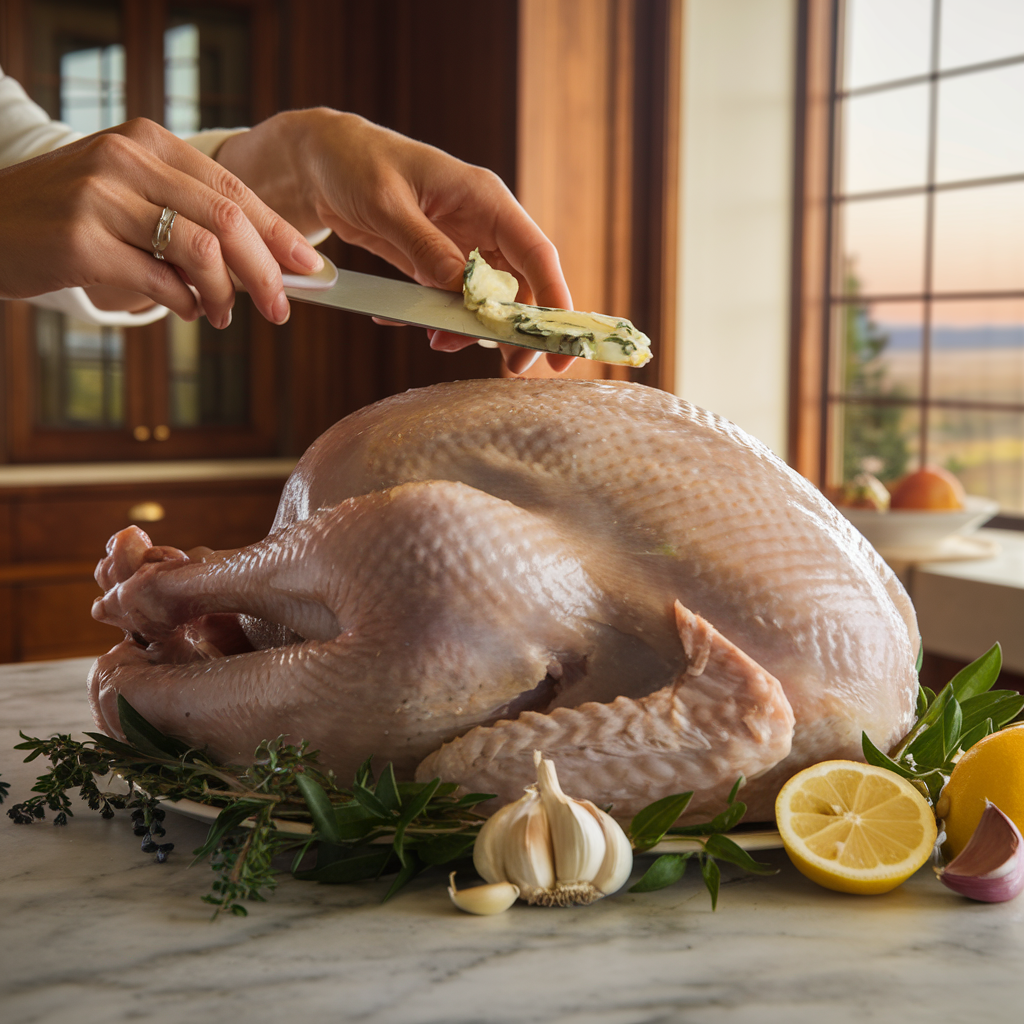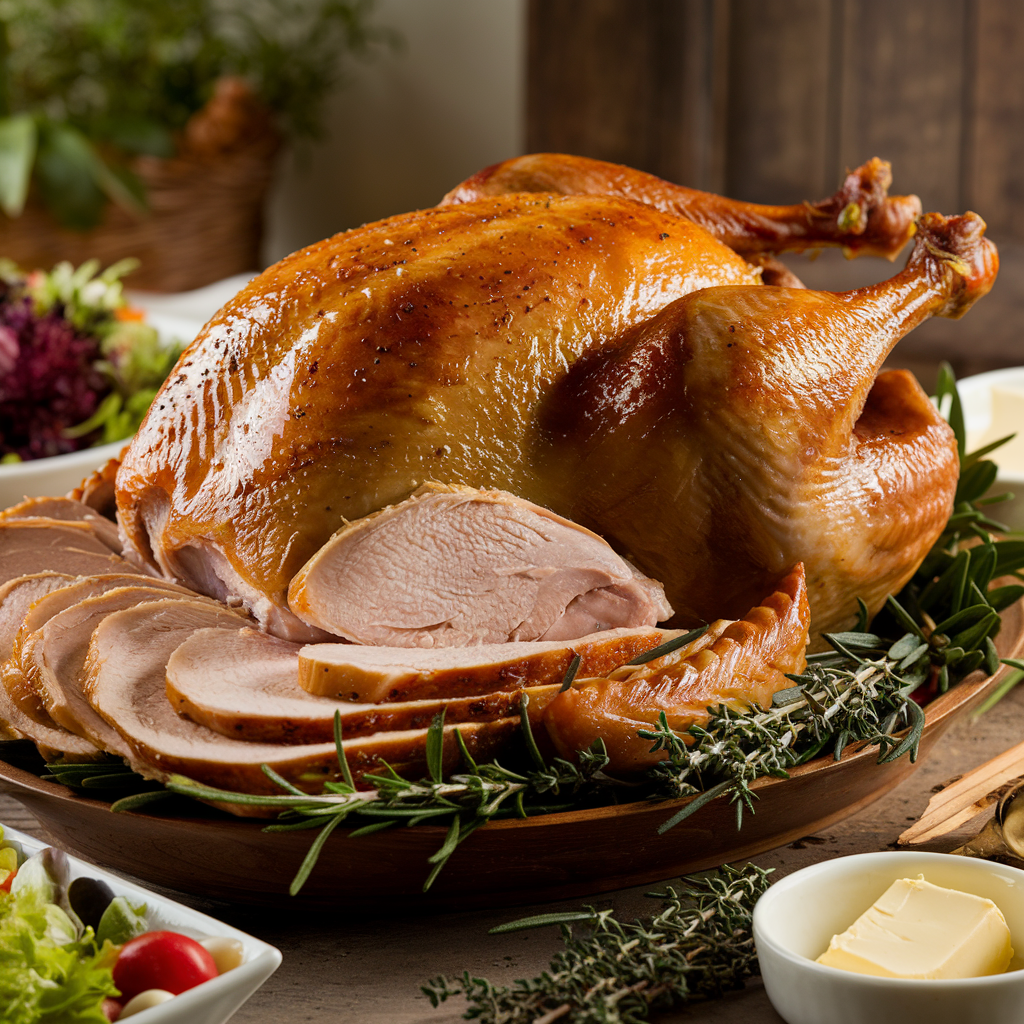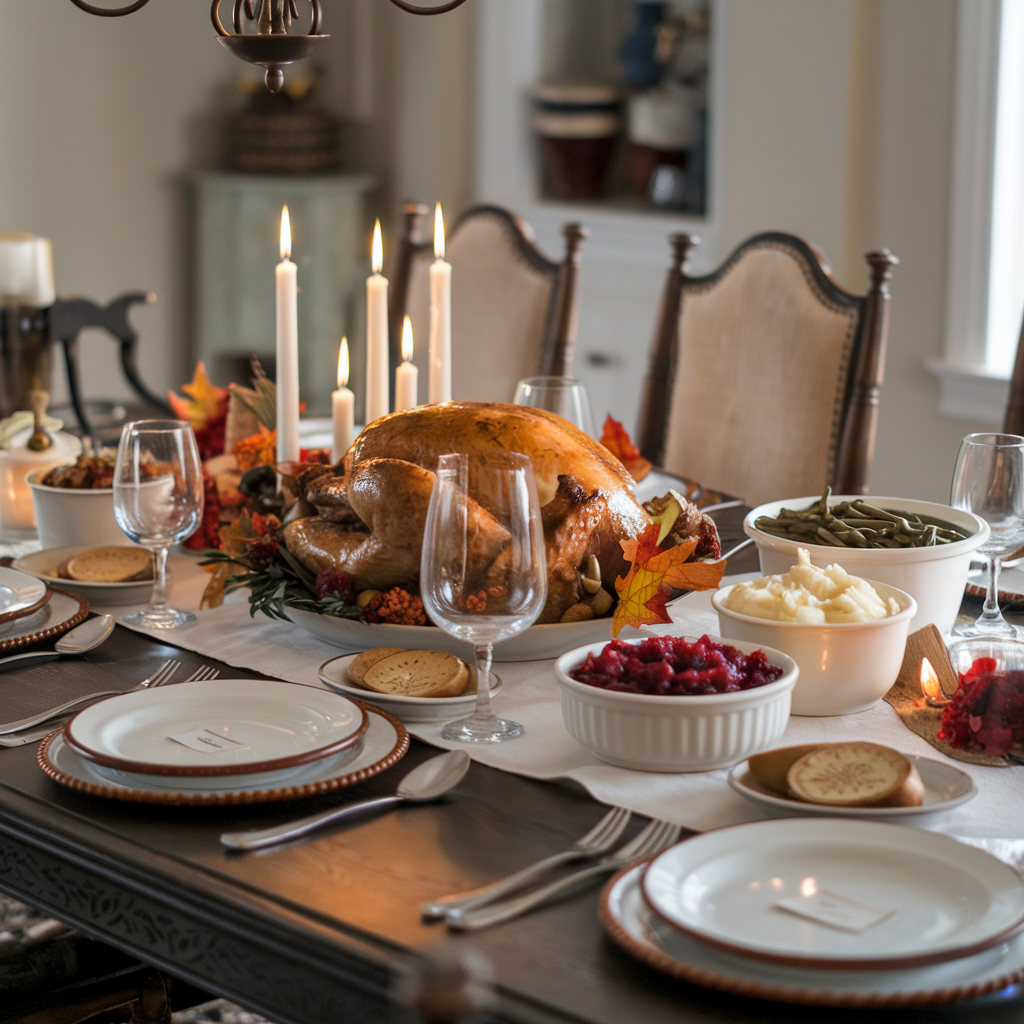Roasting a turkey is a tradition that brings families together, fills the house with mouthwatering aromas, and creates memories around the dinner table. But when it comes to preparing the perfect turkey, one question sparks endless debate: should you butter your turkey before roasting it? If you’ve ever wondered whether slathering butter on your bird is the secret to achieving golden-brown skin and juicy meat, you’re not alone. Let’s dive into this deliciously controversial topic!
The Tradition of Buttering a Turkey: A Historical Perspective
Butter and turkey have a history as rich as gravy. Generations of home cooks have turned to butter as their go-to ingredient for roasting turkeys, believing it’s the key to a moist, flavorful bird. Butter’s role in cooking dates back centuries, but its connection to Thanksgiving’s centerpiece grew stronger with the rise of traditional American recipes.
Why Butter Became a Popular Choice for Roasting Turkeys
Why butter? It’s simple: butter is both flavorful and versatile. Its creamy texture makes it easy to spread, and its rich taste enhances the natural flavors of turkey. In older recipes, butter was often mixed with herbs and spices to create compound butter, giving the turkey not only moisture but a punch of aromatic goodness.
“Butter is like the magician of the kitchen; it transforms the ordinary into the extraordinary.”
Cultural Variations in Turkey Roasting Methods
While butter is a staple in many American households, other cultures take different approaches. For example, in Mediterranean regions, olive oil often takes the place of butter. Some Asian recipes focus on marinades and glazes, while many Latin American recipes prioritize rubs and spices. The choice of butter or alternative fat depends on tradition, taste, and cooking techniques.
The Science Behind Buttering Your Turkey
If you’ve ever wondered why butter is so effective, the answer lies in science. Butter isn’t just about taste; it actually changes the way your turkey cooks.
How Butter Affects Moisture and Texture
One of butter’s magical properties is its ability to lock in moisture. When applied under the skin, butter creates a barrier that prevents the turkey’s natural juices from evaporating too quickly. This results in tender, juicy meat that practically melts in your mouth.
Butter’s Role in Enhancing Flavor
Butter is a flavor carrier. It absorbs and amplifies the tastes of herbs, garlic, and spices you mix into it. When the butter melts during roasting, it seeps into the meat, infusing it with those added flavors. Think of it as giving your turkey a savory spa treatment.
Does Butter Help with Browning and Crispy Skin?
Who doesn’t love a turkey with perfectly crispy, golden-brown skin? Butter’s high fat content helps with browning, giving your turkey that Instagram-worthy appearance. However, it’s important to watch the roasting time closely; butter’s low smoke point can sometimes lead to uneven browning or burnt spots if the temperature is too high.
Common Problems When Buttering a Turkey
While buttering your turkey has its perks, it’s not without its challenges. Here are some common issues and how to tackle them.
Does Butter Make the Turkey Too Greasy?
Some cooks worry that buttering a turkey will leave it greasy or oily. This can happen if you overdo it. The key is balance: a thin, even layer of butter is sufficient to enhance the flavor without making the bird feel like it’s been dunked in a fryer.
Uneven Butter Application and Its Effects
Smearing butter on a cold turkey isn’t as easy as it sounds. Uneven application can lead to patches of the bird cooking differently. To solve this, let the butter soften to room temperature and use your hands to spread it evenly. Bonus tip: use a butter baster for precision.
“Even butter distribution is the secret handshake of seasoned turkey roasters.”
Challenges with Butter Burning During Roasting
Butter’s low smoke point means it can burn if your oven’s too hot. This can leave your turkey with a bitter taste. To prevent this, consider mixing your butter with oil or adding a layer of foil during the initial cooking stages.

Alternatives to Butter for Turkey Roasting
If you’re not sold on butter or want to try something different, there are plenty of alternatives that can deliver similar (or even better) results.
Olive Oil: A Healthier Substitute?
Olive oil is an excellent alternative to butter. It’s heart-healthy, easy to apply, and doesn’t burn as quickly. Plus, its neutral flavor makes it a great base for herb and spice blends.
Compound Butter vs. Plain Butter
Why settle for plain butter when you can use compound butter? Mix softened butter with garlic, rosemary, thyme, or any of your favorite herbs for a flavorful upgrade. It’s like giving your turkey a coat of gourmet goodness.
Dry Brining: A No-Butter Method for Juicy Turkey
If buttering isn’t your thing, dry brining is another way to lock in moisture. Rubbing the turkey with salt, sugar, and spices a day before roasting can yield juicy results without adding extra fat.
How to Properly Butter Your Turkey
So, you’ve decided buttering is the way to go—but how do you do it right? Preparing a turkey with butter requires a bit of technique and finesse. Let’s go step-by-step to ensure your turkey turns out perfectly golden and delicious.
Step-by-Step Guide to Buttering Under and Over the Skin
- Start with Room-Temperature Butter: Softened butter is much easier to work with. Let it sit out for about 30 minutes before starting.
- Prepare Your Compound Butter: Add herbs, garlic, lemon zest, and any other seasonings to your butter. Mix well until smooth.
- Loosen the Skin: Gently slide your fingers between the skin and the meat to create pockets for the butter. Be careful not to tear the skin.
- Apply Butter Under the Skin: Take small scoops of your compound butter and spread it evenly under the skin, focusing on the breast and thighs.
- Rub Butter on the Outside: Use the remaining butter to coat the outer skin of the turkey for extra crispiness and flavor.
“Think of buttering your turkey as giving it a flavorful armor that locks in juices and delivers crispy perfection.”
Tips for Infusing Butter with Herbs and Spices
For an extra flavor boost, infuse your butter with:
- Fresh Herbs: Rosemary, thyme, sage, and parsley work wonders.
- Citrus Zest: Lemon or orange zest adds a bright, zesty note.
- Spices: Paprika, cayenne, or smoked chili powder for a kick.
Should You Butter the Skin, the Meat, or Both?
The great debate! While buttering the skin gives you that golden-brown finish, buttering under the skin ensures the meat stays juicy and flavorful. The best approach? Do both! It’s a win-win for flavor and presentation.
Expert Opinions on Buttering Your Turkey
Not convinced yet? Let’s see what the experts have to say. Professional chefs and culinary enthusiasts have weighed in on the butter debate, and their insights might surprise you.
What Do Chefs Say About Butter vs. Other Methods?
Many chefs swear by buttering under the skin for optimal flavor. They argue that while oil is a great alternative, nothing beats the richness and depth that butter brings to the table.
Culinary Studies and Experiments: Butter’s Impact on Flavor
Studies have shown that butter’s fat content helps retain moisture and enhances overall taste. Experimenting with butter versus oil often highlights how butter creates a more succulent, flavorful result.

FAQs
Should I butter the turkey the night before roasting?
Yes, you can butter the turkey the night before roasting. This allows the butter and seasonings to penetrate the meat for more flavor. Just ensure the turkey is properly refrigerated and covered to prevent drying out.
Can I use margarine instead of butter?
While margarine can be used, it won’t give you the same rich flavor or browning properties as butter. Margarine also contains more water, which might result in less crispy skin.
How much butter should I use for a turkey?
For a medium-sized turkey (12-14 pounds), you’ll need about half a cup of butter. Adjust the amount based on the size of the bird—enough to coat under the skin and on the surface evenly.
Does buttering the turkey affect the cooking time?
Not significantly. However, butter might cause faster browning on the skin. Keep an eye on the turkey and consider tenting it with foil if it browns too quickly.
What if I don’t have time to butter under the skin?
If you’re short on time, focus on spreading the butter evenly on the surface. While buttering under the skin enhances flavor and moisture, surface buttering alone can still improve taste and browning.
Why Do People Put Cranberry Sauce on Turkey?
Cranberry sauce is a classic pairing with turkey because it balances the rich, savory flavors of the meat with its tangy sweetness. The acidity of the cranberries cuts through the fattiness of the turkey, creating a delightful contrast that enhances the overall meal. Historically, cranberries were abundant in North America and became a staple in traditional Thanksgiving feasts. Plus, their vibrant color adds visual appeal to the plate, making the dish as pleasing to the eye as it is to the palate.
Should You Butter Your Turkey Before Roasting?
Absolutely! Buttering your turkey before roasting can elevate its flavor, lock in moisture, and achieve that desirable golden-brown skin. Whether applied under the skin, over the skin, or both, butter adds richness and helps herbs and spices adhere better. However, it’s essential to spread the butter evenly and manage the cooking temperature to prevent burning. Buttering is a technique that many home cooks swear by, but the final decision depends on your personal preferences and dietary considerations.
Why Do People Put Butter on Their Turkey?
People butter their turkeys because it improves both flavor and texture. Butter helps the skin crisp up beautifully while keeping the meat juicy. It also acts as a vehicle for infusing herbs and spices into the turkey, making every bite flavorful. Think of butter as the glue that binds all the seasonings to the turkey while creating a mouthwatering, golden crust. This simple ingredient has been a go-to for generations of cooks looking to perfect their roast turkey.
How Does Gordon Ramsay Keep the Turkey Moist?
Gordon Ramsay keeps his turkey moist by using a combination of techniques, including buttering under the skin, frequent basting, and starting the roasting process at a high temperature to lock in juices. He often recommends using a flavored butter infused with herbs and garlic to spread under the skin, ensuring the flavors penetrate the meat. Ramsay also advocates for resting the turkey after roasting, allowing the juices to redistribute evenly throughout the bird. His methods emphasize both flavor and texture, ensuring a moist, delicious turkey every time.
Conclusion
So, should you butter your turkey before roasting it? The answer depends on your preferences, but the benefits are undeniable. Buttering your turkey enhances flavor, locks in moisture, and gives you that gorgeous golden-brown skin we all dream of. However, it’s not without its challenges, so taking the right approach is essential.
Whether you stick with classic butter, try an alternative like olive oil, or skip the fat altogether in favor of a dry brine, the key is to find a method that works for you and your family. After all, the perfect turkey is the one that brings everyone together at the table. So, grab your butter (or not), fire up that oven, and let the roasting begin! Happy cooking!

